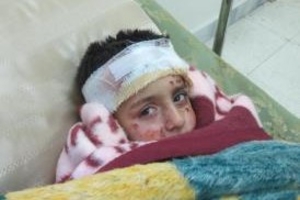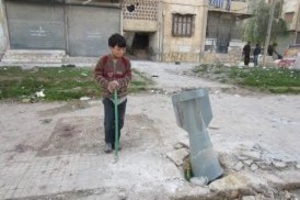
In a field hospital, which I won’t name for security reasons – too many field hospitals have been bombed already – a little boy of 7, Abdo al-Dik, was shaking like a leaf and moaning in pain with deep lacerations to his abdomen and legs.
Relatives had just collected his 3-year-old brother Nizar’s body for burial. Another brother, 8-year-old Subhi, was still missing as of 6pm.
In the same hospital room, 6-year-old Mustafa Ali was lying in a bed with shrapnel injuries to the head, neck and shoulders – alone and waiting for someone from his family to come find him. He told me that he was visiting his relatives when the air strike happened; a neighbour said that the child’s relatives were badly injured and he did not know whether they had survived.
In another room, Fahad, a 9-year-old boy with a nasty shrapnel injury to his left leg, kept repeating: “Baba (Father), I don’t want to die, I want to go home”. He was lucky though as his injury was relatively minor, compared to those of the other children I saw.
These children are some of the victims of a multiple cluster bomb attack launched on the morning of Friday 1 March against a densely populated residential housing estate in Aleppo.
The attack killed at least 19 and injured more than 60 – we won’t know the final death and injury toll for some days, as some families fled the area for fear of further attacks. The more seriously injured were evacuated to hospitals in Turkey and the rest are being treated in various field hospitals around the city. Many of the victims were children who were playing in the alleys and gardens of the housing estate.
The attack took place at about 11.30am. I arrived in Aleppo shortly after and went to the area – the Masaken Hanano district, to the east of the city centre. It was much worse than initial reports suggested.

The Syrian air force dropped nine Soviet-made RBK cluster bombs – each carrying up to 150 cluster submunitions – in the middle of a large housing estate. I found one bomb eight metres from the front door of one of the buildings; three in a small garden between the buildings; one on a rooftop; two in a small empty space between the buildings; one in the middle of an alley; and one in another garden.
I also found unexploded cluster submunitions (bomblets) all over the place: on the roofs of buildings; on the pavements and in the alleys and gardens between the buildings. Members of armed opposition groups who control the area rapidly filled a sack with the unexploded bomblets that were left lying around. The buildings’ walls were peppered with shrapnel, and here and there are holes where the lethal bomblets penetrated the walls, exploding inside people’s homes.
Noura, a 20-year-old woman I found in one of the hospitals, told me that she was injured in her apartment. Her sister who was by her side asked me: “Why is the world doing nothing while we continue to be bombed to pieces every day, even inside our homes?”
I had no answer.
Whoever orders these relentless indiscriminate attacks – including with internationally banned cluster bombs – and the pilots who drop these bombs do so knowing that they will kill and maim children and other civilians who have nothing to do with the conflict.
They should know too that one day they will be held accountable for such war crimes.


